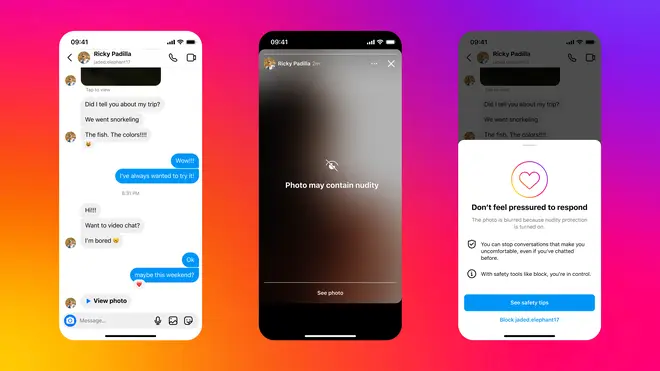
Ian Payne 4am - 7am
11 April 2024, 09:24

The tech giant has unveiled a range of new tools, including a nudity filter in direct messages and working with other firms on finding bad actors.
Meta has unveiled a range of new safety features designed to protect users, in particular young people, from “sextortion” and intimate image abuse.
The social media giant – which owns Facebook, Instagram and WhatsApp – has confirmed it will begin testing a nudity filter in Direct Messages (DMs) on Instagram.
Called Nudity Protection, this feature will be on by default for those aged under 18 and will automatically blur images sent to users which are detected as containing nudity, better protecting users from seeing unwanted nudity in their DMs.
When receiving nude images, users will also see a message urging them not to feel pressure to respond, and an option to block the sender and report the chat.
With the filter turned on, people sending images containing nudity will also see a message reminding them to be cautious when sending sensitive photos, and be given the chance to unsend these photos.
The tool uses on-device machine learning to analyse whether an image contains nudity, meaning it will work inside end-to-end encrypted chats, and Meta said it will only see any images if a user chooses to report them to the company.
“Financial sextortion is a horrific crime,” Meta said in a blog post on the updates.
“We’ve spent years working closely with experts, including those experienced in fighting these crimes, to understand the tactics scammers use to find and extort victims online, so we can develop effective ways to help stop them.
“Today, we’re sharing an overview of our latest work to tackle these crimes. This includes new tools we’re testing to help protect people from sextortion and other forms of intimate image abuse, and to make it as hard as possible for scammers to find potential targets – on Meta’s apps and across the internet.
“We’re also testing new measures to support young people in recognising and protecting themselves from sextortion scams.”

Elsewhere, the social media giant said it was testing new detection technology to help identify accounts potentially engaging in sextortion scams and limit their ability to interact with everyone, but especially younger users.
Meta said message requests from these suspicious accounts would be routed straight to a user’s hidden requests folder.
For younger users, suspicious accounts will no longer see the “Message” button on an teenager’s profile, even if they are already connected, and the firm was testing hiding younger users from these accounts in people’s follower lists to make them harder to find.
Meta added that it was also testing new pop-up messages for people who may have interacted with such accounts – directing them to support and help if they need it.
In addition, the company said it was expanding its work with other platforms to share details about accounts and behaviours that violate child safety policies as part of the Lantern programme created last year.
“This industry cooperation is critical, because predators don’t limit themselves to just one platform – and the same is true of sextortion scammers,” Meta said.
“These criminals target victims across the different apps they use, often moving their conversations from one app to another.
“That’s why we’ve started to share more sextortion-specific signals to Lantern, to build on this important cooperation and try to stop sextortion scams not just on individual platforms, but across the whole internet.”
Lantern is a programme run between different tech companies which shares information about suspicious accounts.